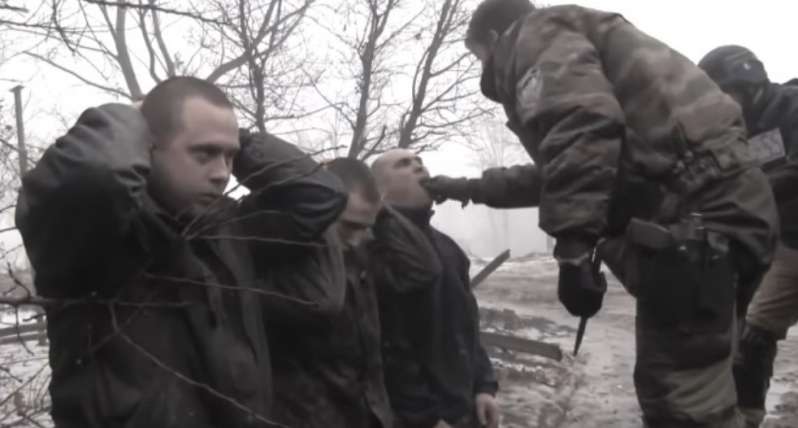With Russia waging war against Ukraine, ask Zelensky why he wants impunity for war criminals

Seven years had passed after Russia’s invasion of Crimea and aggression in Donbas before Ukraine’s legislators finally adopted a bill enabling liability for war crimes. It is now five months since the final date that Ukrainian President Volodymyr Zelensky had to either sign this bill into law, or veto it, providing suggestions as to what amendments needed to be made. Zelensky will be holding his ‘press marathon’ on 26 November, and it is to be hoped that somebody will ask him why he is breaching the Constitution, ignoring calls from victims of war crimes or their relatives, Ukrainian and international NGOs and single-handedly prolonging Ukraine’s effective impunity for war crimes.
The bill passed, after years of stalling, on 20 May 2021 is ‘On amendments to certain legislative acts of Ukraine regarding implementation of international criminal and humanitarian law’. It aims to bring Ukraine’s Criminal Code into line with international criminal law so that perpetrators of grave international crimes can be held to account. The bill’s relevance cannot be overstated given Russia’s invasion and ongoing occupation of Crimea, and the military conflict in Donbas.
The most important amendment is the addition to Article 8 of Ukraine’s Criminal Code crimes where universal jurisdiction applies, these being crimes of aggression; genocide; crimes against humanity and war crimes. Such universal jurisdiction means that a state can bring criminal proceedings in respect of such crimes, irrespective of where the crime took place or the nationality of the perpetrator and victim. It also means that there can be no time bar in respect of such crimes.
Until the new bill comes into force, Ukraine’s Criminal Code continues to lack the legal instruments needed to qualify crimes that became all too common in 2014. It does cover the crime of genocide, but has nothing about crimes against humanity. Article 438 (violation of the laws and customs of war) has very vague formulations regarding war crimes, while the article on the crime of aggression is not in keeping with the contemporary definition of this crime. All of this has meant that the charges laid usually fail to encompass the full weight of the crimes committed. Killing a prisoner of war in cold blood should not, for example, be qualified as ‘murder’ when it is, unquestionably, a war crime.
Almost a year has passed since the Prosecutor of the International Criminal Court [ICC] Fatou Bensouda stated that she had found reasonable grounds for believing that war crimes and crimes against humanity, falling within ICC jurisdiction had been committed “in the context of the situation in Ukraine” and that the crimes were sufficiently grave to warrant ICC investigation.
Under such circumstances it is deeply disturbing that Ukraine’s legislators should have taken so long to adopt vital legislative changes and that the President should now be effectively blocking their entry into force.
It is certainly difficult to view such failure to sign the bill as oversight. On 15 September 2021, a large number of prominent Ukrainian NGOs addressed an open appeal to both President Zelensky and the Speaker of the Verkhovna Rada. On 30 September, a similar appeal was signed by international NGOs, including the International Federation for Human Rights and Human Rights Watch.
The Ukrainian NGOs pointed out, for example, that human rights groups had gathered thousands of accounts of torture, including through electric currents attached to genital parts, mock executions (guns fired near a person’s head, being nailed into a coffin); beatings; rape and other crimes. They pointed out that the draft law, now awaiting the President’s signature, had been drawn up in close cooperation with human rights defenders, Ukrainian and foreign experts. It had been welcomed by international organizations and international missions working in Ukraine.
“The law is designed to give hope of justice to tens of thousands of people who have already suffered from war crimes and crimes against humanity as a result of Russian aggression, and to prevent new atrocities against ordinary people”.
So who does not want that?
Worth noting concerns over the last several months regarding other baffling developments in Ukraine that could also obstruct investigations into war crimes and international criminal proceedings. The most disturbing was, undoubtedly, the removal of Gyunguz Mamedov from his post as head of the ‘War Department’ (formally called the ‘Department for overseeing criminal proceedings into crimes committed in conditions of military conflict’).
There was an apparent breakthrough on 9 November with the SBU [Ukraine’s Security Service] reporting the capture in Kyiv of Denis Kulikovsky, or ‘Palych’. Former hostages held and tortured at the Izolyatsia secret prison in occupied Donetsk call Kulikovsky the ‘chief butcher’ at Izolyatsia and have provided harrowing accounts of torture he was involved in. The problem with the breakthrough is, however, that it appears to have been brought about thanks to former hostage and writer Stanislav Aseyev who learned of Kulikovsky’s whereabouts. The latter had by then been living in Kyiv for two years, seemingly with the SBU’s knowledge. There is also baffling secrecy and apparent lack of progress in the trial of Roman Lyahin, a militant leader who seized the Izolyatsia arts and culture centre in June 2014 and helped turn it into what ex-hostages refer to as a concentration camp.





